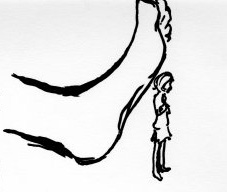- White characters are never described as white but everyone else is described as their colors, as if “white” were default.
- White is not a monotone. There’s tan, pink cast, olive cast, freckled, etc. etc.
- Make people think. Ask questions with your stories–but you don’t have to answer them. Perhaps you shouldn’t answer them.
- We love the characters we grow to know. If the “bad boy” has the most backstory, he’s probably whom we are going to love.
- Choose characters that you really like or really dislike. This makes for stronger writing.
- E-books are great for readers who already know what they want. But print is still how you get the most new readers, the people casually browsing.
- Gritty vs. Realism vs. Darkness. Things to think about.
- A little extra realism can’t hurt your story.
- Write what you think the world is like.
- See people solve problems in a place that feels real.
- Lastly, write what you want to write.
- Stay firmly in your characters’ head for all worldbuilding. Characters don’t know that they’re missing XYZ that we have. Unravel what the reader thinks they know about your world, their automatic conceptions and misconceptions slowly, in glimpses.
- Different authors develop different percentages of the worldbuilding iceberg. Some just do “ice on a raft”, as GRRM says.
- Do we overestimate our own importance as writers?
- I am a planetary citizen. Part of my responsibility is to understand others. Writing is our way of trying to figure things out for ourselves, too, in how the world works, how people work.
- Life is a mix of hope and sorrow. Other times and places have that mix, too. There should be a balance. You have to have the dark along with the light, (and the light along with the dark).
From Robin Hobb:
- If you are writing, you are a writer. (I’m glad I’m not the only one who thinks this.)
- There is no wrong way to write.
- It’s so easy to put off writing. There’s always an excuse not to write. You never actually will have any “extra free time” in which to write. You just make time. There is time if you can find it.
- It’s not “write what you know”, it’s write who you are.
- Break things down into manageable parts. Write one scene at a time.
- How to find your endings: Where the next story begins is the ending of this one. In other words, where a story ends is where the next story begins.
- Every paragraph you write has possibility. It’s like shutting doors in a corridor.
- Have confidence in your characters to let them do what they actually would do. Make sure they are challenged. Don’t protect them from things happening to them.
- Never throw away anything you’ve written. There will be something you can use in it. Always keep a paper copy and put it in a safe place.







